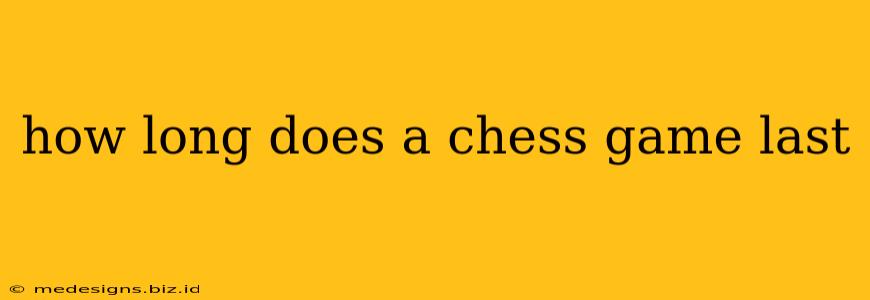How Long Does a Chess Game Last? A Comprehensive Guide
The simple answer is: it depends. There's no fixed timeframe for a chess game. The duration can vary wildly depending on several factors, making it a game of both skill and endurance.
Factors Affecting Chess Game Length
Several key elements influence how long a chess match will take:
-
Skill Level of Players: A game between two grandmasters might take hours, even exceeding five hours, due to their deep strategic understanding and meticulous planning. Beginner games, on the other hand, can often be concluded in under 30 minutes. The higher the skill level, the longer the game tends to last.
-
Time Control: Tournament chess utilizes specific time controls, dictating how much time each player has for their moves. Common time controls include:
- Rapid chess: Games with time controls around 15-30 minutes per player.
- Classical chess: Games with longer time controls, typically 90 minutes or more per player. These can stretch to many hours.
- Blitz chess: Very fast games, often with only 3-5 minutes per player.
- Bullet chess: Extremely fast games, with time controls of only a few seconds or even less.
-
Game Opening: The opening phase can significantly impact game length. A sharp, tactical opening might lead to a quick finish, while a more positional opening can extend the game.
-
Middlegame Complexity: The middle game is where strategic battles unfold. Complex positions with many tactical possibilities tend to prolong the game.
-
Endgame Technique: Skill in the endgame can determine the game's length. A player with superior endgame technique can often convert a slight advantage into a win more quickly.
Typical Game Lengths by Time Control
To provide a clearer picture, here's a rough estimate of typical game lengths based on common time controls:
- Bullet Chess: 5-10 minutes (or even shorter!)
- Blitz Chess: 10-30 minutes
- Rapid Chess: 30-60 minutes
- Classical Chess: 1-5+ hours
Remember: These are just estimates. Exceptional games, regardless of time control, can sometimes deviate significantly from these ranges.
Why Game Length Matters
Understanding the potential duration of a chess game is crucial for:
- Tournament Planning: Organizers need to account for the time required for each round.
- Player Preparation: Players need to manage their energy and focus for the entire duration of the match.
- Spectator Experience: Knowing the potential length helps manage expectations for viewers.
In conclusion, there's no single definitive answer to "how long does a chess game last?". The actual duration is a dynamic interplay of player skill, chosen time control, and the strategic unfolding of the game itself.
